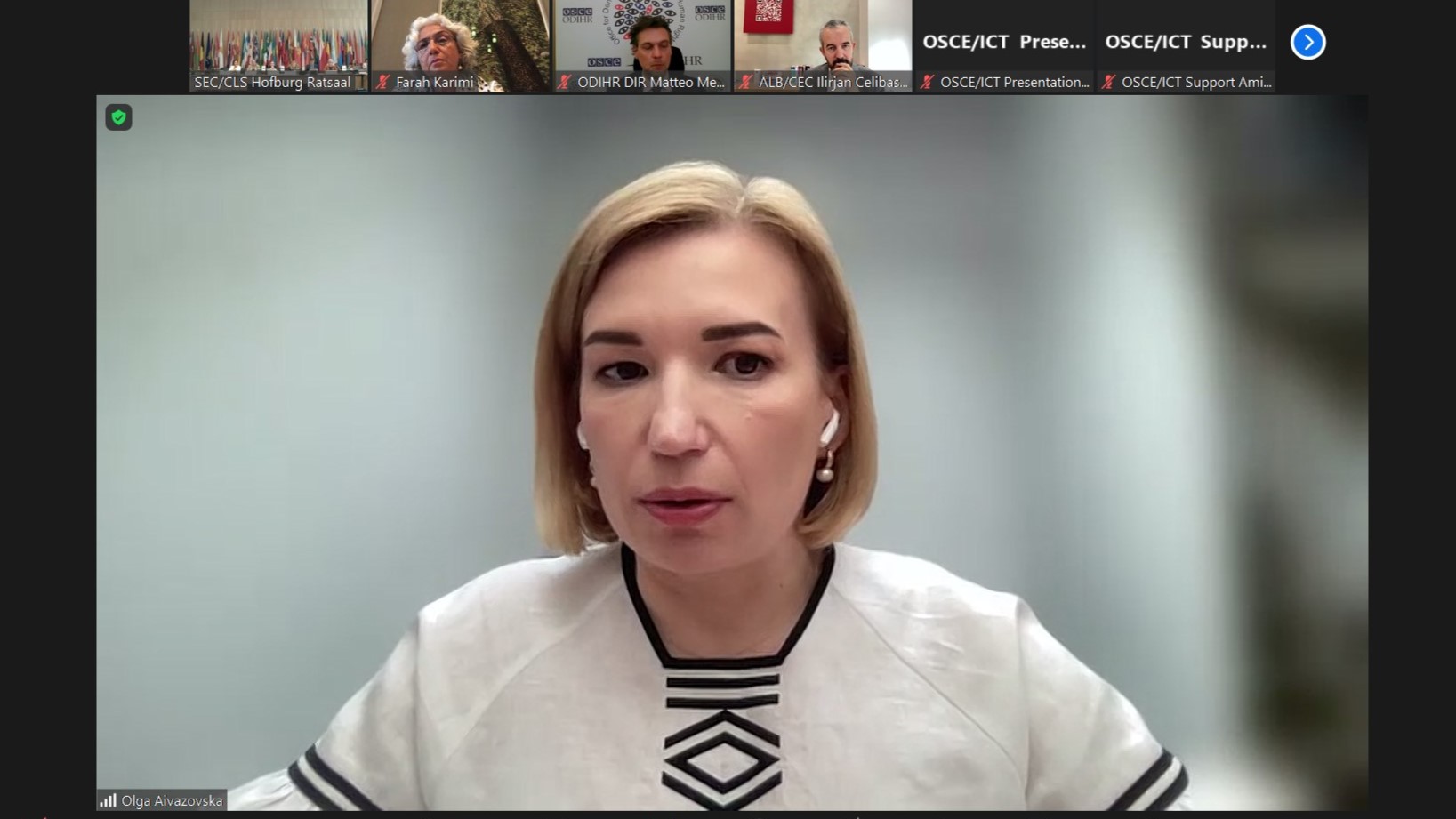Impactful election observation helps prevent offenses. That is why the pressure that the Georgian authorities are currently exerting on national monitoring organizations is unacceptable. Olga Aivazovska, the Civil Network OPORA`s Chairperson, mentioned this during her speech at the Meeting of the Human Dimension Committee, which took place on May 14 in Vienna.
At the event, delegates discussed the role of election observation in improving electoral processes and promoting inclusive reforms; how the transparency of election and democratic processes can be strengthened in the OSCE area, including through follow up of ODIHR’s recommendations; what is the role of civil society in election observation. During the session, their speeches proclaimed also Ilirjan Celibashi, Chairperson, Central Electoral Commission of Albania, Zofia Lutkiewicz, Board Member, European Platform for Democratic Elections, Meaghan Fitzgerald, Head of the Election Department, ODIHR. The event was organized by the Permanent Mission of Ireland to the Organization for Security and Cooperation in Europe.

The text of the speech below:
Dear colleagues and participants!
I'm sincerely grateful for your attention to the topic of strengthening election observation and inclusive reforms. Three years ago, OPORA wrote a book about how it took us ten years to have the Election Code adopted and how important was the interaction between various local and international actors in order to promote the following changes:
- transparency of the election process and the organization of free and fair elections;
- electoral system with open party lists;
- equal participation of women and men in elections;
- accessible polling stations for people with disabilities;
- effective investigation of crimes against electoral rights.
The Ukrainian experience shows that success is only possible if there is cooperation between national and international partners. However, each election cycle brings new challenges with innovations, and reforms cannot be limited to one stage. Impactful election observation helps prevent offenses and spread the word of truth. Elections in Ukraine in recent years have not only been recognized as free and fair but have also led to the adoption of the Election Code, amendments to the Criminal Code, and the Code of Administrative Offenses. Ukraine implemented the recommendations of the Venice Commission regarding the electoral system, and the OSCE-ODIHR mission reported that law enforcement agencies began to perform their role during the elections in a distinguished and politically independent manner.
And then Russia started a full-scale unprovoked aggression, and it is impossible to hold elections in our country until the active phase of war is over. Nevertheless, we haven't put our work on hold, but we plan the first post-war elections and are now working with partners to develop high-quality legislation for this extraordinary event.
At the same time, another country and its civil society are facing the risk of not having any opportunities to fulfill their mission of non-partisan observation of the elections in Georgia this year. The pro-Russian government plans to limit the work of independent organizations at the legislative level. Georgian authorities deliberately oppose the country's membership in the EU and daily violate their own citizens' freedom of peaceful assembly. The key goals of the authorities include:
- disruption of European integration efforts as a guarantee of the democratic development of Georgia;
- preparation to hold elections this fall without non-partisan and independent observers as they will be recognized as "foreign agents";
- narrowing the space for NGOs activities in the country.
These are very scary alerts. The example of Russia and restricting the work of independent organizations are a bad practice which is spreading in Europe and narrows the citizens' rights to association, peaceful protests, and independent election monitoring.
As Board Chair at GNDEM, I would like to share an important appeal regarding the civil society in Georgia. The Global Network of Domestic Election Monitors (GNDEM) expresses its deep concern with efforts to undermine the right of citizens to monitor their own election processes, both through the Georgian Parliament’s consideration of the Russian-style foreign influence law and the constant verbal attacks by government officials on citizen observers – from ISFED, GYLA and TI-Georgia – and the ongoing harassment of civic leaders more broadly.
The draft law was adopted by the Georgian Parliament. It threatens citizens’ right to peacefully assemble and organize for the benefit of the Georgian people. GNDEM also expresses solidarity with Georgian citizens, civic activists, and journalists in the face of government repression while exercising their right of peaceful protest.
As the United Nations Special Rapporteur on the Situation of Human Rights Defenders stated, election observers, including nonpartisan citizen election observers, are human rights defenders who serve to protect civil and political rights of citizens and that “Member States are urged to take all necessary steps to establish conditions that allow national and international election observers to effectively do their work, and to protect them from any violence, threats, retaliation, adverse discrimination, pressure or any other arbitrary action as a consequence of their legitimate exercise of their rights and freedoms.”
This law poses critical risks to the integrity of this electoral process and the rights of citizen election observers. We urge the Georgian President not to sign this law and Georgian authorities to hold accountable any officials responsible for the harassment of representatives and staff of GNDEM members ISFED and GYLA, as well as other prominent civic organizations including TI-Georgia. GNDEM also appeals to international and regional observation missions and institutions to support citizen observers and other human rights defenders in Georgia.
